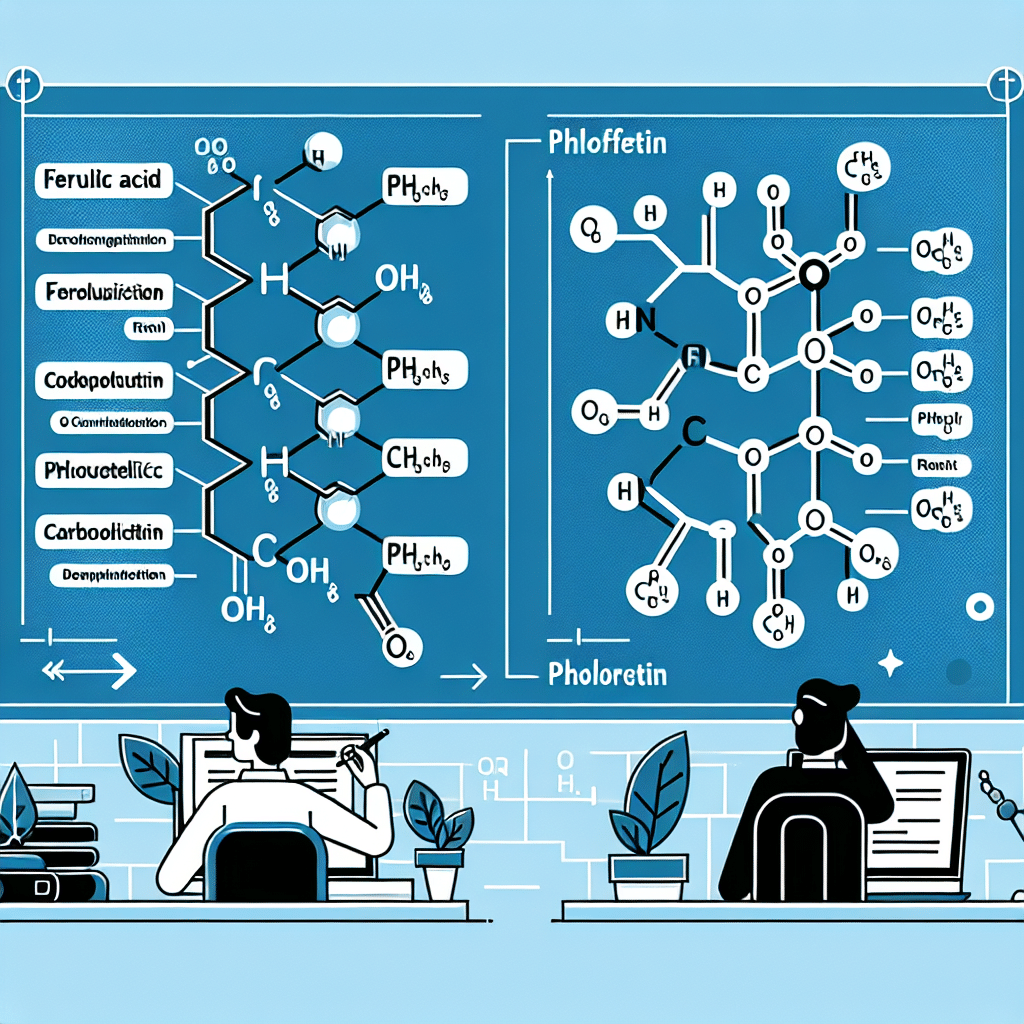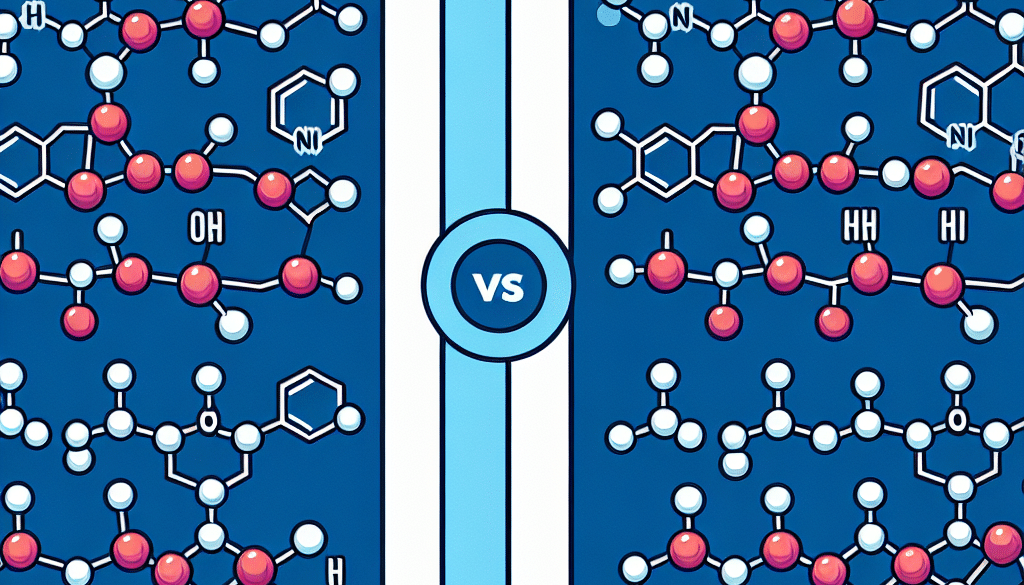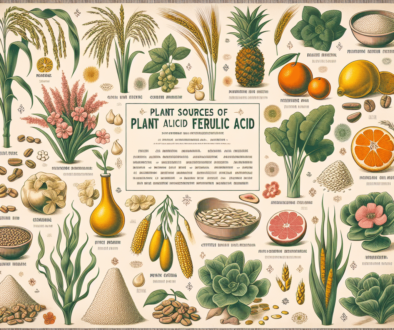What Is The Difference Between Ferulic And Phloretin?
-
Table of Contents
- Ferulic vs. Phloretin: Understanding the Differences in Skincare
- Introduction to Antioxidants in Skincare
- What is Ferulic Acid?
- What is Phloretin?
- Comparing Ferulic Acid and Phloretin
- Antioxidant Properties and Stability
- Targeted Skin Concerns
- Skin Penetration
- Choosing Between Ferulic Acid and Phloretin
- Conclusion: Key Takeaways
- Discover ETprotein’s Premium Protein Products
Ferulic vs. Phloretin: Understanding the Differences in Skincare

When it comes to skincare ingredients, the market is flooded with various compounds that promise to rejuvenate, protect, and enhance the health of your skin. Among these, antioxidants have gained significant attention for their ability to neutralize free radicals and prevent oxidative stress. Two such antioxidants that have become popular in skincare formulations are ferulic acid and phloretin. While they may seem similar at first glance, ferulic acid and phloretin have distinct properties and benefits. This article delves into the differences between these two potent antioxidants, providing insights into their unique advantages for skin health.
Introduction to Antioxidants in Skincare
Antioxidants are crucial in skincare due to their ability to combat the damaging effects of free radicals, which are unstable molecules that can harm skin cells and accelerate aging. By neutralizing free radicals, antioxidants help to protect the skin from environmental stressors such as UV radiation, pollution, and cigarette smoke. This protective action can lead to reduced signs of aging, improved skin texture, and a more radiant complexion.
What is Ferulic Acid?
Ferulic acid is a plant-based antioxidant found in the cell walls of grains, fruits, and vegetables such as rice, oats, apples, and oranges. It is known for its ability to fight free radicals and its synergistic effects when combined with other antioxidants like vitamins C and E. Ferulic acid is particularly valued in skincare for its ability to enhance the stability and efficacy of vitamin C, making it a common ingredient in serums and creams aimed at reducing the signs of aging.
- Stabilizes Vitamin C and E
- Protects against UV-induced damage
- Reduces fine lines and wrinkles
- Improves overall skin tone and texture
What is Phloretin?
Phloretin is another powerful antioxidant derived from the bark of apple trees, as well as the leaves and fruit of apples and pears. It is known for its ability to penetrate the skin’s surface and work at the cellular level. Phloretin is often used in skincare products designed to target hyperpigmentation, as it can inhibit the activity of an enzyme responsible for the production of melanin, the pigment that gives skin its color.
- Penetrates the skin’s surface to work at a cellular level
- Inhibits melanin production to reduce hyperpigmentation
- Enhances the penetration of other skincare ingredients
- Provides broad-spectrum protection against free radicals
Comparing Ferulic Acid and Phloretin
While both ferulic acid and phloretin are antioxidants that offer protective benefits for the skin, they have different mechanisms of action and are suited for different skin concerns.
Antioxidant Properties and Stability
Ferulic acid is particularly effective at enhancing the stability of other antioxidants, which is why it is often formulated with vitamins C and E. This combination results in a more potent and longer-lasting antioxidant effect. Phloretin, on the other hand, is known for its ability to provide broad-spectrum protection against a variety of free radicals on its own.
Targeted Skin Concerns
Ferulic acid is ideal for those looking to combat the signs of aging, such as fine lines, wrinkles, and loss of firmness. Its ability to stabilize vitamin C also makes it effective in brightening the skin and evening out skin tone. Phloretin is more targeted towards addressing hyperpigmentation issues, such as age spots, melasma, and uneven skin tone, due to its melanin-inhibiting properties.
Skin Penetration
Phloretin is known for its ability to penetrate the skin’s surface and deliver benefits at a cellular level. This characteristic also helps to enhance the penetration of other skincare ingredients. Ferulic acid works primarily on the surface of the skin, providing a protective barrier against environmental aggressors.
Choosing Between Ferulic Acid and Phloretin
When deciding between ferulic acid and phloretin, consider your primary skin concerns and the goals you wish to achieve with your skincare routine. If you are looking to enhance the effects of vitamin C and E in your regimen and focus on anti-aging benefits, ferulic acid may be the better choice. If you are dealing with hyperpigmentation and desire a more even skin tone, phloretin could be the more suitable option.
Conclusion: Key Takeaways
In summary, ferulic acid and phloretin are both valuable antioxidants in skincare, each with its own set of benefits. Ferulic acid is excellent for stabilizing other antioxidants and targeting signs of aging, while phloretin is effective in penetrating the skin and addressing hyperpigmentation. Understanding the differences between these two compounds can help you make an informed decision about which is best suited for your skincare needs.
Discover ETprotein’s Premium Protein Products
If you’re looking to incorporate high-quality protein into your diet or skincare routine, consider ETprotein’s range of organic bulk vegan proteins and L-(+)-Ergothioneine (EGT). Their products are characterized by a neutral taste, non-GMO, allergen-free attributes, and high purity levels, making them an excellent choice for various industries, including nutraceuticals, pharmaceuticals, cosmeceuticals, and food and beverage.
ETprotein specializes in exporting and delivering tailor-made protein powder and finished nutritional supplements. Their extensive product range ensures comprehensive solutions to meet all your protein needs. Trusted by leading global brands, ETprotein is your go-to source for premium protein products.
About ETprotein:
ETprotein, a reputable protein and L-(+)-Ergothioneine (EGT) Chinese factory manufacturer and supplier, is renowned for producing, stocking, exporting, and delivering the highest quality organic bulk vegan proteins and L-(+)-Ergothioneine. They include Organic rice protein, clear rice protein, pea protein, clear pea protein, watermelon seed protein, pumpkin seed protein, sunflower seed protein, mung bean protein, peanut protein, and L-(+)-Ergothioneine EGT Pharmaceutical grade, L-(+)-Ergothioneine EGT food grade, L-(+)-Ergothioneine EGT cosmetic grade, L-(+)-Ergothioneine EGT reference grade and L-(+)-Ergothioneine EGT standard. Their offerings, characterized by a neutral taste, non-GMO, allergen-free attributes, with L-(+)-Ergothioneine purity over 98%, 99%, cater to a diverse range of industries. They serve nutraceutical, pharmaceutical, cosmeceutical, veterinary, as well as food and beverage finished product distributors, traders, and manufacturers across Europe, USA, Canada, Australia, Thailand, Japan, Korea, Brazil, and Chile, among others.
ETprotein specialization includes exporting and delivering tailor-made protein powder and finished nutritional supplements. Their extensive product range covers sectors like Food and Beverage, Sports Nutrition, Weight Management, Dietary Supplements, Health and Wellness Products, and Infant Formula, ensuring comprehensive solutions to meet all your protein needs.
As a trusted company by leading global food and beverage brands and Fortune 500 companies, ETprotein reinforces China’s reputation in the global arena. For more information or to sample their products, please contact them and email sales(at)ETprotein.com today.














